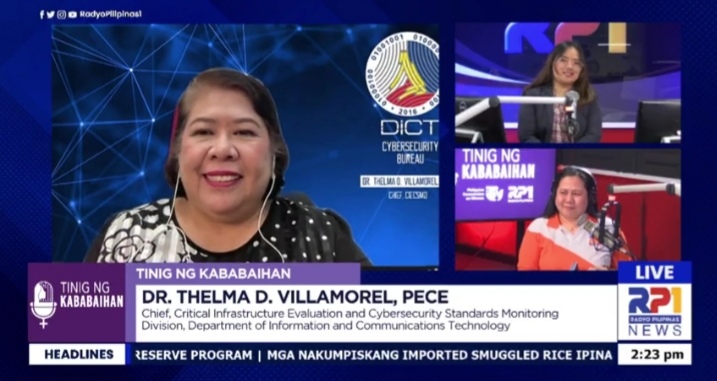Why women, young girls are 'most vulnerable' to cybercrime
PCW's Tinig ng Kababaihan addresses cyber-related threats against girls, women
Young girls and women are the “most vulnerable” to cyber crimes such as scamming and hacking.

This was highlighted during the Philippine Commission on Women's (PCW) program Tinig ng Kababaihan (TNK) on Sept. 22, where an expert discussed the threats to women and young girls in cyberspace.
“Paboritong target ng mga cyber criminals ang mga kababaihan dahil ang mga kababaihan ay mas gumagamit ng mga online platforms sa shopping, paying bills and work from home (The favorite target of the cyber-criminals are women, as they use the online platforms more in shopping, digital transactions and online work),” said Department of Information and Communications Technology (DICT) Critical Infrastructure Evaluation and Cybersecurity Standards Monitoring Division Chief Thelma D. Villamorel.
During the program, the results of the National Information and Communications Technology Household Survey (NICTHS) and the Women and Information Communications Technology Development Index (WIDI) also mentioned there was an increase in the percentage of crimes against women who “often” use cell phones and computers.
The surveys presented during the PCW program highlighted that between 2019 and 2022, the percentage of hacking incidents increased from 3.38 percent to 32.2 percent, and incidents of phishing rose from 0.55 percent to 8.2 percent.
Meanwhile, Villamorel said that online scamming was also the top crime in the Philippines which includes illegal access, computer illegal identity theft, ATM and credit card fraud, and cyber-threats among others as per the Philippine National Police (PNP) and anti-cybercrime group.
'Love scam'
Villamorel explained that the “love scam” is another way of “deceiving” women, as scammers court women first until they give in and ask for money.
She reminded women to be cautious of this type of scam.

"Dahil sa long hours ng pagbababad sa internet, mas malaki po ang tyansa na mabibiktima ang mga babae kaya lagi po naming sinasabi na mag-ingat po tayo at maging responsableng user ng internet (Due to the long hours spent on the internet, there is a greater chance that women may become victims, which is why we always say, let's be careful and responsible internet users),” she said.
Victimizing young girls
The results of the Philippine Online Kids Survey of the United Nations Children's Fund (UNICEF) where 90 percent of Filipino young girls between the ages of five to 15 are exposed to the internet with 71 percent using smartphones and rendering a 116-hour screen time per week was also discussed during the program.
Villamorel advised parents of young girls at the age of two to five to prohibit children from using gadgets to avoid going to sites that may put them in danger.
She added that young girls are also vulnerable to cyber threats and bullying.
Beware of using free public wifi
Meanwhile, Villamorel warned users that hackers may take advantage of the use of free public wifi by imitating the name of the server.
"Ang mga hacker ay pwede nilang gayahin ang pangalan ng public WiFi at oras na ikaw ay kumonekta dito, lahat ng data na iaccess mo ay makukuha ng hacker (The hackers could mimic the name of the public WiFi and once you connect to it, all data that you accessed could be used by the hacker)", Villamorel said.
She also advised against using financial applications like online banking when connecting to public wifi.
Villamorel provided safety tips for avoiding cybercrime attacks like having a stronger password, being cautious in clicking links, not accepting friend requests from unfamiliar people, using multi-factor authentication, and installing anti-virus applications. (Lizst Torres Abello)